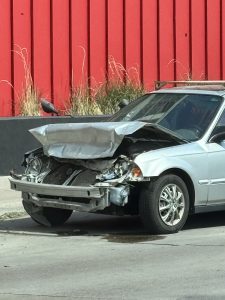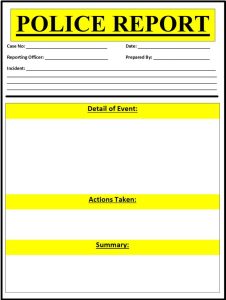by Jennifer O'Connell | Jul 23, 2024 | Auto Accident, Bicycle Accident, Brain Injury, Bus Accident, CO Truck, Colorado, DUI, Kentucky, Motorcycle Accident, Pedestrian Accident, Personal Injury, Slip and Fall, Tennessee, Train Accident, Trucking Accident, Workers' Compensation
After being in an accident, we know the last thing you want to do is report it to the insurance company fearing they will raise your rates. You may be thinking how much of a financial stress is ahead of you in the near future, but thanks to Colorado statute C.R.S. §10-4-628, your insurance rates CANNOT increase if you are not at fault.
C.R.S. 10-4-628 states:
(1) No insurer shall cancel; fail to renew; refuse to write; reclassify an insured under; reduce coverage under, unless the reduction is part of a general reduction in coverage filed with the commissioner; or increase the premium for, unless the increase is part of a general increase in premiums filed with the commissioner, any complying policy because the applicant, insured, permissive user, or any resident of the household of the applicant or insured has:
(a) Had an accident or accidents that are not the fault of such named applicant, insured, household member, or permissive user.
Suppose you were in an accident that was not your fault which then left you with over $100,000 in medical bills, and the party that hit you had bodily injury limits of only $25,000. We know that $25,000 is not enough to pay off your medical bills, nor is it enough to try and compensate you for your trauma, lost wages, bills, etc. That is where your UIM coverage will kick in. Underinsured motorist protection is triggered if the other party does not have sufficient coverage for your losses. Then your insurance will step in and provide the additional coverage.
What if the party that hit you does not have insurance coverage? How will you pay for your medical bills? That is where UM coverage steps in. Uninsured motorist protection offers coverage if the at fault driver does not have the required insurance coverage. This way you are still protected.
In Colorado, by law it is required to have UIM/UM coverage on your auto insurance policy with minimum limits of $25,000 per person, $50,000 per accident. However, if one chooses to opt out of this, they may do so by rejecting the coverage in writing. This is something we strongly DO NOT recommend, as it is better to be safe than sorry and pay more to have the extra layer of protection you need just in case. Having the extra coverage can seem silly as we always think these things can never happen to us, but you will be thankful for having it if you ever find yourself in the unfortunate situation where UIM/UM is necessary.

by Amy Foster | Jun 25, 2024 | Auto Accident, Brain Injury, Kentucky, Motorcycle Accident, Pedestrian Accident, Personal Injury, Tennessee, Trucking Accident
In honor of National Tire Safety Week, take a moment to ensure your tires are good to go! Summer travel in extreme temperatures can affect tire safety and wear. Taking care of tires is important for several reasons. First, well-maintained tires are essential for safe driving, as they provide traction and control. Proper tire care also improves fuel efficiency and ensures a smoother ride. Lastly, regular tire maintenance can extend the lifespan of your tires, saving you money in the long run.
When traveling on the road during the summer, it’s essential to ensure safe travels by taking care of various aspects, including tire safety. Here are some tips to have safe travels on the road in the summer:
1. Check Tire Safety: Before hitting the road, make sure to check your tires. Extreme temperatures during summer can affect tire safety and wear. Check tire pressure, tread wear, and overall condition regularly.
2. Proper Maintenance: Properly maintain your tires by checking tire pressure monthly, checking your alignment, rotating your tires, and inspecting your tire tread. This will help ensure your tires are in good condition for safe travels.
3. Stay Informed: Stay informed about tire safety tips and best practices. For valuable information, visit websites like NHTSA.gov/TireWise.
4. Be Prepared: Pack an emergency roadside kit with essential items such as a spare tire, jack, lug wrench, and a tire pressure gauge.
By following these tips and staying proactive about tire safety, you can contribute to safe travel during the summer.
by Jennifer O'Connell | Jun 10, 2024 | Auto Accident, Bicycle Accident, Brain Injury, Bus Accident, CO Truck, Colorado, DUI, Motorcycle Accident, Pedestrian Accident, Personal Injury, Train Accident, Trucking Accident
¡Esto es muy dificil! Cuando terminara esto??
Como si sufrir una lesión en un accidente automovilístico no fuera suficientemente malo, ahora lo bombardean con citas médicas y facturas, necesita tiempo libre en el trabajo, soportar dolores diarios, necesita un auto de alquiler y muchas otras tensiones. ¡Es demasiado difícil! Créame, lo entendemos. Nadie quiere pasar por una situación como esta y es por eso que hacemos lo que hacemos para ayudarte a superarla. En Queener Law nos encargamos de las comunicaciones con las compañías de seguros, haciendo malabarismos con el seguro médico y los gravámenes, y negociando el mejor monto de liquidación disponible mientras usted se concentra en lo más importante: su recuperación.
 Si nunca has experimentado una situación como esta y estás abrumado y asustado, ¡está bien! Estamos aquí para ayudar. Podemos desglosar los pasos del proceso para usted a lo largo del camino.
Si nunca has experimentado una situación como esta y estás abrumado y asustado, ¡está bien! Estamos aquí para ayudar. Podemos desglosar los pasos del proceso para usted a lo largo del camino.
¿Qué pasa primero? Una vez que nos contrata para representarlo, inmediatamente nos ponemos en marcha. Todas las compañías de seguros involucradas reciben cartas de representación de nuestra parte indicándoles que proporcionen a nuestra oficina la información sobre la póliza y los límites y preserven todas y cada una de las pruebas. ¿Cuál es la mejor parte de esto? También les indicamos que no se comuniquen con usted. Permítanos ocuparnos de la compañía de seguros mientras usted descansa y nos ocupamos de sus lesiones.
Y que lo que suceda a continuación depende de su plan de tratamiento. Usted nos mantiene actualizados con sus citas y, cuando haya completado el tratamiento, solicitaremos sus archivos completos a sus proveedores médicos. Una vez que todo está listo, creamos un paquete de demanda que incluye un resumen de cada cita a la que asistió, gastos de bolsillo, libro de facturas médicas, reembolso de millas y una descripción detallada del impacto que este incidente tuvo en su estilo de vida. Queremos convertirlo en un ser humano a los ojos del ajustador de seguros, no simplemente en un número de reclamo común y corriente.
Una vez que se ha presentado el paquete de demanda y el liquidador de seguros ha tenido tiempo de revisarlo, comienzan las negociaciones. Lo mantendremos actualizado con los montos de la oferta y le explicaremos qué significa ese número para el monto de su bolsillo. ¡Con su permiso, continuamos negociando hasta que tengamos la oferta máxima absoluta posible para su reclamo! Unas cuantas firmas aquí y allá y tendrás un trato.
Con frecuencia nos preguntan al comienzo de los casos: ¿Cuánto vale mi caso? ¿Cuanto tiempo tomara mi caso? Estas son preguntas muy abiertas y todas varían según el caso. Algunos factores que influyen en esto son: gravedad de las lesiones, responsabilidad, costo del tratamiento médico, permanencia y, por supuesto, los límites de la póliza de seguro. Lo mejor para usted es no comenzar las negociaciones hasta que su tratamiento haya finalizado y todos los registros médicos y las facturas estén listos. Las compañías de seguros prefieren ver los registros y las facturas del tratamiento en lugar de las recomendaciones de tratamiento. Desafortunadamente, esto a veces nos pone a merced de los proveedores médicos cuando se trata de plazos. Nuestro trabajo es hacer lo que sea mejor para usted, y eso significa no enviar su paquete de demanda hasta que todo esté listo.
Sabemos que este no es un proceso divertido para usted, pero hacemos todo lo posible para que sea lo más fácil posible. Haremos todo lo posible para acelerar este proceso tanto como sea posible, pero siempre mantendremos su mejor interés ante todo para que lo único de lo que tenga que preocuparse sea de curarse, recuperarse y volver a su vida normal.
by Jennifer O'Connell | Jun 10, 2024 | Auto Accident, Bicycle Accident, Brain Injury, Bus Accident, CO Truck, Colorado, DUI, Motorcycle Accident, Pedestrian Accident, Personal Injury, Train Accident, Trucking Accident
¿Necesito un reporte policial?

La respuesta corta es SI. Desde golpes en los guardabarros hasta accidentes automovilísticos importantes, obtener un reporte policial es crucial no sólo para establecer los detalles del accidente, sino también para determinar la responsabilidad. Dependiendo de la naturaleza del accidente, un oficial puede darle la opción de enviar su propio informe en línea o permitirle que lo haga ellos mismos. La mejor opción es dejar que los oficiales hagan el informe mientras están en la escena para que no se pierda información vital. Y si por algún motivo debe presentar su propio informe (por ejemplo, no hay ningún oficial en la escena), le recomendamos que lo haga lo antes posible para que no se olviden detalles sobre el accidente que podrían afectar su caso. En Colorado, la ley establece que tiene 60 días a partir de la fecha del accidente para presentar su informe. Aunque la ley de Colorado no exige reporte policial para colisiones menores de $1,000 en danos de propiedad y que la otra parte no sufre lesiones o muerte, a largo plazo puede beneficiarle informarlo a la agencia adecuada, ya que contiene detalles que ayudarán a las compañías de seguros mientras trabajan con este reclamo.
Pero, ¿Qué tipo de información hay en el reporte policial que lo hace tan importante? Contiene dónde ocurrió el accidente, a qué hora, quiénes estuvieron involucrados, quiénes fueron los testigos, fotografías de la escena, observaciones de los oficiales, un diagrama de lo sucedido y a qué velocidad conducían las partes. Además de eso, el informe también mostrará si recibió una citación y quién, lo que facilitará mucho a las compañías de seguros determinar la responsabilidad.
Entendemos lo aterrador que puede ser verse involucrado en un accidente automovilístico y sabemos que lo primero que desea hacer es regresar a casa e intentar pasarlo por alto; sin embargo, le recomendamos encarecidamente que se tome el tiempo adicional necesario para permitir que los agentes de policía evalúe la escena y haga un reporte policial que podría marcar la diferencia en su reclamo de seguro.
by Jennifer O'Connell | Jun 10, 2024 | Auto Accident, Bicycle Accident, Brain Injury, Bus Accident, CO Truck, Colorado, DUI, Motorcycle Accident, Pedestrian Accident, Personal Injury, Product Liability, Slip and Fall, Train Accident, Trucking Accident
Do I Need a Police Report?
The short answer is YES. From fender benders to major vehicle accidents, obtaining a police report is crucial to not only establish the details of the accident, but to determine liability as well. Depending on the nature of the accident, an officer may give you the option to submit your own report online or allow them to make a report themselves. The best choice is to let the officers do the report while on scene so no vital information gets missed. And if some reason you are required to submit your own report (ex: no officer on scene), we recommend you do it ASAP so details about the accident are not forgotten that could potentially affect your case. In Colorado, the law states you have 60 days from the date of the accident to file your report. Even though Colorado law does not require police reports for minor collisions that are less than $1,000 in property damage and do not result in the other party being injured or deceased, it can benefit you in the long run to report it to the proper agency as it contains details that will help insurance companies while working this claim.
But what type of information is on the police report that makes it so important? It contains where the accident happened, what time, who was involved, who were the witnesses, photographs of the scene, officer observations, a diagram of what happened and how fast the parties were driving. Besides that, the report will also show if and who received a citation, which will make it much easier for insurance companies to determine liability.
We understand how scary it can be to be involved in a car accident and we know the first thing you want to do is go home and try to put it past you, however we strongly encourage you to take the extra time needed to allow police officers evaluate the scene and make a police report that could make a difference in your insurance claim.

by Queener Law | Jun 4, 2024 | Auto Accident, Tennessee
Texting Ban for Teen Drivers
Texting bans for teen drivers have been shown to reduce distracted driving and potentially save lives. Research indicates that implementing such bans can lead to a decrease in car accident fatalities among teenage drivers. According to a study published in the American Journal of Public Health, states with texting laws in place experienced a 2.3 percent drop in overall car accident fatalities for drivers of all ages. Moreover, the bans were most effective when officers were permitted to enforce the law proactively, leading to a 3 percent reduction in traffic fatalities. This data suggests that texting bans can promote road safety and safeguard teen drivers from distracted driving.
Texting Ban Law
Research has shown that texting bans can decrease car accident fatalities among drivers of all ages. Proactive enforcement of these laws is particularly effective in reducing traffic fatalities. With the success of texting bans for teen drivers and the recent Hands-Free Law in Tennessee, it’s clear that addressing distracted driving through legislation is crucial. Full implementation of texting bans nationwide could significantly promote road safety and prevent accidents caused by texting and driving.
The Hands-Free Law, also known as the Hands-Free Act, which aims to reduce distracted driving by prohibiting handheld electronic devices. This law makes it illegal for drivers to hold a phone or other electronic devices to make a call, use any app, or read or write a text while their vehicle is in motion. The law allows for using hands-free technology, such as Bluetooth or voice-command features, to make calls or send messages while driving. Implementing this law is part of ongoing efforts to improve road safety and reduce the number of accidents caused by distracted driving in Tennessee.
All states’ texting bans aim to reduce distracted driving by prohibiting drivers from texting while their vehicle is in motion. It makes it illegal for drivers to hold a phone or other electronic devices to make a call, use any app, or read or write a text while driving. The ban allows for using hands-free technology, such as Bluetooth or voice-command features, to make calls or send messages while driving. Proactive enforcement of these laws is particularly effective in reducing traffic fatalities.
The Problem Remains
Even though these bans show that progress is possible, Queener Law understands that no amount of distracted driving is acceptable. Until texting while driving is completely eradicated, accidents such as those seen in McMinn County, Tennessee, will continue to occur. NBC affiliate WRCBtv Chattanooga reports that a 17-year-old boy was allegedly texting as he drove on State Route 39. He drifted into the oncoming lane, occupied by a McMinn County deputy, and failed to notice because he was engrossed with his phone. The two vehicles crashed head-on with enough force to push the deputy’s vehicle back nearly 10 feet. The deputy suffered broken ribs and damage to one of his ankles.
Dangerous accidents will likely continue to occur until drivers learn to focus on driving. Those who have been injured in an accident caused by a distracted driver should contact Henry Queener for assistance with seeking compensation for their injuries.


 Si nunca has experimentado una situación como esta y estás abrumado y asustado, ¡está bien! Estamos aquí para ayudar. Podemos desglosar los pasos del proceso para usted a lo largo del camino.
Si nunca has experimentado una situación como esta y estás abrumado y asustado, ¡está bien! Estamos aquí para ayudar. Podemos desglosar los pasos del proceso para usted a lo largo del camino.
